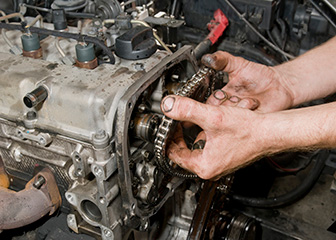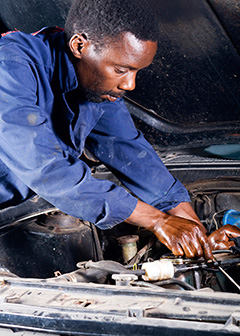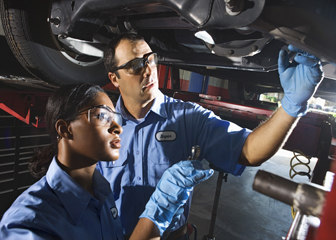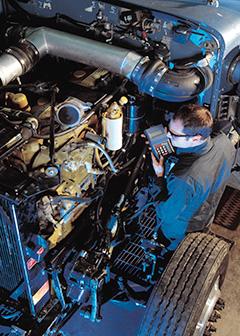How to Become a Diesel Service Technician or Mechanic About this section

A mechanic replaces a chain on a diesel engine.
Many diesel mechanics learn informally on the job, but employers increasingly prefer applicants who have completed postsecondary training programs in diesel engine repair. Although not required, industry certification is important for diesel mechanics.
Education
Most employers require a high school diploma or equivalent. High school or postsecondary courses in automotive repair, electronics, and mathematics provide a strong educational background for a career as a diesel mechanic.
Many employers look for workers with postsecondary training in diesel engine repair. A large number of community colleges and trade and vocational schools offer programs in diesel engine repair. These programs usually last 6 months to 2 years and may lead to a certificate of completion or an associate’s degree.
Programs mix classroom instruction with hands-on training, including the basics of diesel technology, repair techniques and equipment, and practical exercises. Students also learn how to interpret technical manuals and electronic diagnostic reports.
Graduates usually advance to journey-worker status, where they may then work with minimal supervision.
Training
Some diesel mechanics begin working without postsecondary education and are trained on the job. Trainees are assigned basic tasks, such as cleaning parts, checking fuel and oil levels, and driving vehicles in and out of the shop.
After they learn routine maintenance and repair tasks and demonstrate competence, trainees move on to more complicated jobs. This process can last from 3 to 4 years, at which point a trainee is usually considered a journey-level diesel mechanic.
Over the course of their careers, diesel mechanics must learn new techniques and equipment. Employers often send experienced mechanics to special training classes conducted by manufacturers and vendors to learn about the latest diesel technology.
Certification
Certification from the National Institute for Automotive Service Excellence (ASE) is the recognized industry credential for diesel and other automotive service technicians and mechanics. Although not required, this certification shows a diesel mechanic’s competence, experience, and value to potential employers and clients.
Diesel mechanics may be certified in specific repair areas, such as drive trains, electronic systems, or preventative maintenance and inspection. To earn certification, mechanics must have 2 years’ work experience and pass one or more ASE exams. To remain certified, diesel mechanics must pass the test again every 5 years.
Licenses
Some diesel mechanics may be required to have a commercial driver’s license if their job duties include test driving buses or large trucks.
Important Qualities
Customer-service skills. Diesel mechanics frequently talk to their customers about automotive problems and work that they have planned, started, or completed. They must be courteous, good listeners, and ready to answer customers’ questions.
Dexterity. Mechanics need a steady hand and good hand-and-eye coordination for many tasks, such as disassembling engine parts, connecting or attaching components, or using hand tools.
Mechanical skills. Diesel mechanics must be familiar with parts and components of engines, transmissions, braking mechanisms, and other complex systems. They must also be able to disassemble, work on, and reassemble parts and machinery.
Technical skills. Modern diesel engines rely heavily on electronic systems to function. Diesel mechanics must be familiar with how the electronic systems operate and with the tools needed to work on them.
Troubleshooting skills. Diesel mechanics must be able to identify mechanical and electronic problems, make repairs, and offer a proper maintenance strategy.









